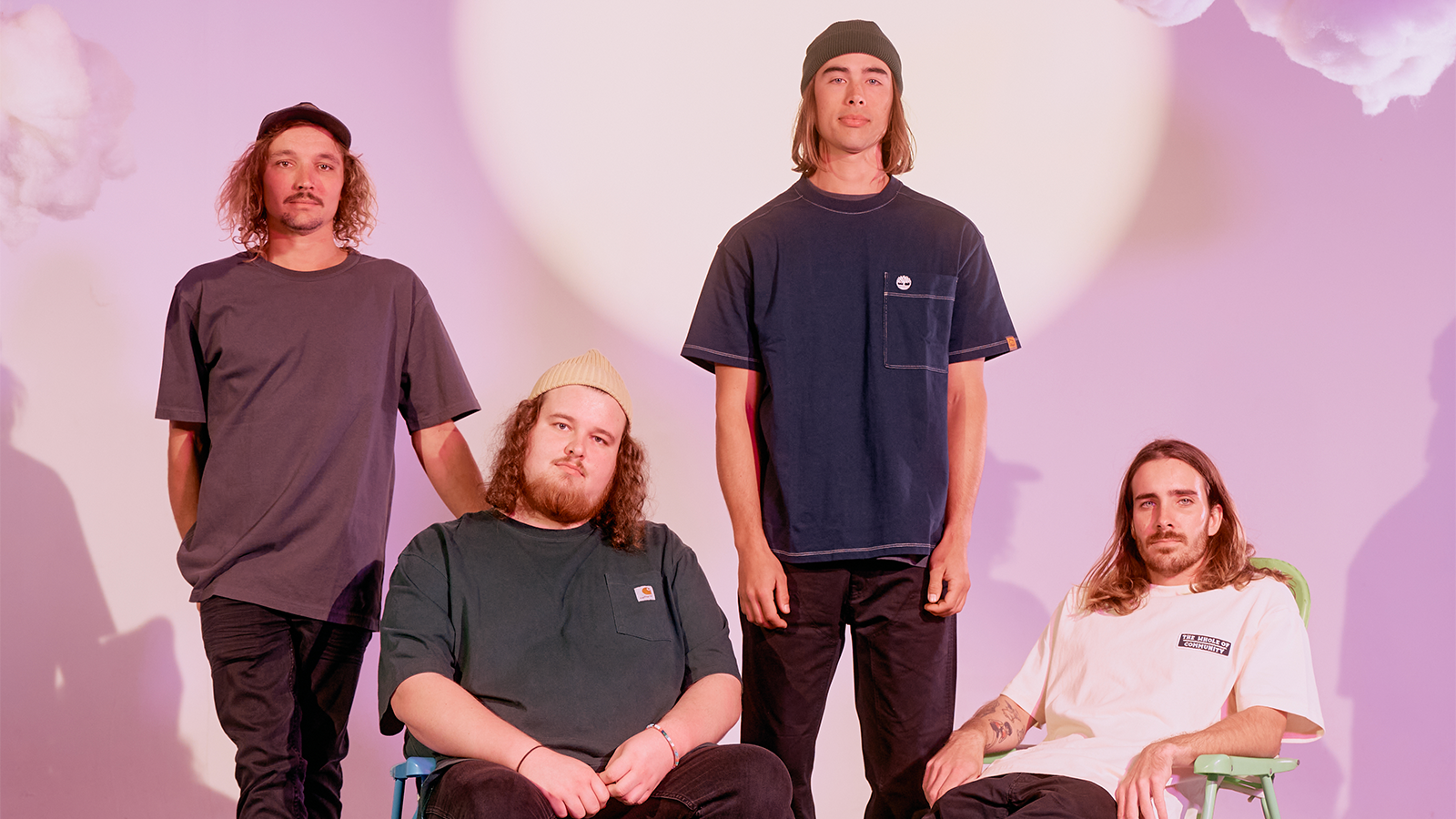Sly Withers: “For however challenging it was to dive that deep into our songs, it was equally exciting”
Just a year on from their second album, Sly Withers have returned with clearer minds and catchier hooks. Australian Guitar journeys through the fierce rock foliage of ‘Overgrown’

All the latest guitar news, interviews, lessons, reviews, deals and more, direct to your inbox!
You are now subscribed
Your newsletter sign-up was successful
There was a five-year gap between Sly Withers’ self-titled debut and Gardens, with the latter album – which arrived last June – presenting a truly reinvented band. Eager to ride its high, the Boorloo-native quartet wasted no time knuckling down on album number three, building on the sentiments explored on Gardens for what shaped up to be their first-ever sequel: Overgrown.
As implied by its title, Overgrown picks up a short while after Gardens, when its protagonists – dual frontmen Jono Mata and Sam Blitvich – had gained just enough perspective to answer the questions they posed on their second opus.
And, as is the case with most sequels, the stakes here are higher – Gardens was an unexpected hit for Sly Withers, debuting at #10 on the ARIA Charts and taking the band on two largely sold-out national tours. One-upping it wasn’t too difficult, though – another benefit of sequels they were able to embrace was the inflated budget; though their first two albums came together in the band’s short bursts of free time between tours and day jobs, they were able to spend months dedicated to crafting Overgrown.
The end result is Sly Withers biggest and most ambitious effort, taking the ideas presented on Gardens and blooming them into an epic showcase of punk-intoned poignancy. Before they take it on the road, Blitvich and Mata gave Australian Guitar a tour of the path they travelled to make it happened.
In the spirit of sequels, how does Overgrown continue the narrative you established on Gardens?
Sam Blitvich: I think the biggest thing is that our songs have always been, like, a subconscious form of journaling for us. We’re always just tracking our lives through the songs, so in a real simplistic sense, Overgrown is a sequel to Gardens because that’s just the way we write songs.
But I think it’s more of a sequel because it approaches the same ideas we were talking about in Gardens, but from that perspective of having a few more years under our belts. We’ve gone from trying to figure out adulthood in our early 20s to figuring out the next stage of our lives with some of those challenges in the rear-view mirror.
Jono Mata: I think the “sequel” thing also came about because a lot of the songs started as ideas we were kicking around when we were making Gardens. That process of writing never really stopped – we finished [Gardens] and then a month or so later, we were back in the studio with another set of demos. So the songs on Overgrown were a product of the time we spent in the immediate aftermath of Gardens – the time we spent away from home, touring, trying to keep our relationships going and dealing with everything going on in Perth.
All the latest guitar news, interviews, lessons, reviews, deals and more, direct to your inbox!
So in that (relatively short) stretch of time, what had you learnt about yourselves that influenced the direction you took on Overgrown?
Blitvich: I think a big thing that Overgrown looks at, which Gardens didn’t, is the future. At least with the stuff I was writing about, Gardens was more about figuring out how to be an adult, whereas Overgrown is a bit more about figuring out how to sustain being an adult, and looking ahead to the rest of my life in a bit more of a “mature” way.
How did that evolved perspective translate to your songwriting?
Mata: I think there was a bit of a change-up that came about because we had more time to work on it. After we put Gardens out, we realised that [songwriting] was something we could take a bit more seriously and turn into more of a “day job” for ourselves. In the past, we’d do it all ourselves [individually] and then we’d bring it to band, and that’s when the collaboration would happen. But this time, it was Sam and I working on the first idea for a song together, demoing it, and then taking it to the band from there. So it was a lot more collaborative from the beginning.
I think this is the first time you’re going to hear both of our ideas going into a song, rather than one of our ideas coming in and the rest of the band adding to it at the end of the process. And it’s interesting because I think our writing styles have always been quite different, but complementary, so working together from the start just meant we could go a bit deeper into the songs.
Did that make it more gratifying to record as well, knowing that these songs were a closer reflection of who Sly Withers are as a full unit?
Blitvich: Yeah, absolutely.
Mata: It was also our first time being in a studio and having the time to strip the songs down and put them back together. In previous sessions, it was like, “Okay, here are the songs that we want to record, let’s record them.” Everything was demoed out by the time we hit the studio, and then we just made it sound better. But [with Overgrown], we had enough time in the studio that we were able to go, “What does the album need? How can we scratch as many itches as possible?”
Going through that process with Dave Parkin was great – it was so beneficial to have someone on the outside being like, “You can do this, you can push for this.” So for a lot of those songs, the final product sounds nothing like the original demo that we went into the studio with. And that was a really exciting way to do it.
Was that an easy process to adapt to?
Mata: There were challenges. You know, you’ll have had this idea for a song for 12 months, and then in the first five minutes of recording it, it’ll be a complete 180 from where you thought it was going to go. That can be a challenging thing to let go of, but you’ve got to trust that process. And we were in great hands to do it. I think everyone’s attitude was that it was the process we needed to get the best album out of us – it was the right way to do it.
Blitvich: And for however challenging of a task it was to dive that deep into our songs, it was equally as exciting. We were all so onboard with the idea of putting a little more time and effort into it, because we wanted to be a lot more deliberate with the recordings, as opposed to just translating whatever happened in the band room while we’re writing them.
Jono and I got to spend something like 10 weeks in the studio – five days a week, Tuesday to Saturday, 10am to 6pm – just crafting these songs, assembling them and talking about them and making them the best songs we could. There were hard bits, for sure, but it was incredibly exciting and incredibly fulfilling.
Mata: Yeah, that was the first time we’ve been able to do a record where it was the only thing on our minds. And just from having that time – you know, 80-hour fortnights in the studio – we had the ability to go down all these rabbitholes that we normally wouldn’t. And then you can still throw away that song at the end of the day and be like, “Well, we’ve got the time to go down another rabbithole tomorrow.” We had way less to be distracted by, so we felt way more comfortable bringing up ideas that we normally wouldn’t.

Ellie Robinson is an Australian writer, editor and dog enthusiast with a keen ear for pop-rock and a keen tongue for actual Pop Rocks. Her bylines include music rag staples like NME, BLUNT, Mixdown and, of course, Australian Guitar (where she also serves as Editor-at-Large), but also less expected fare like TV Soap and Snowboarding Australia. Her go-to guitar is a Fender Player Tele, which, controversially, she only picked up after she'd joined the team at Australian Guitar. Before then, Ellie was a keyboardist – thankfully, the AG crew helped her see the light…
